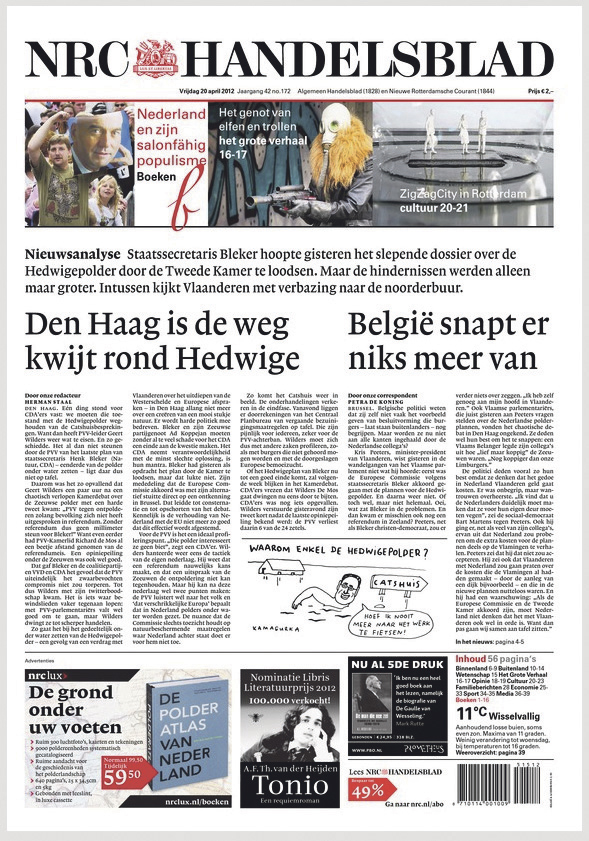Politicians and also TU scientists have opposite views as to whether the Hedwigepolder, close to the border with Belgium, should be flooded partially, fully or not at all.
During the last decade, few subjects were as heavily debated as the Hedwigepolder. In 2005 it was decided that this part in the province of Zeeland should be flooded in order to create space for nature. This was necessary because the Western Scheldt, the gateway to the port of Antwerp, was deepened to allow large cargo ships to reach the harbour, which changed the underwater life dramatically. Consequently, it was decided to enhance the estuary – coastal waters connected to a river and open sea – by flooding the Hedwigepolder as compensation.
The Netherlands and Flanders signed an agreement, with Flanders paying a large part of the costs. However, residents of Zeeland strongly oppose the plan, because it puts a beloved part of their province under water. A new plan was made to flood a smaller area along the Western Scheldt of the Hedwigepolder and two other areas along the Western Scheldt. This issue was recently discussed in the Dutch Parliament. “If we look at the current Dutch and European environmental and law legislation, putting the whole of the Hedwigepolder under water is the best solution for creating an estuary. This will exactly create what needs to be created, an intertidal area, rich in ecosystem services,” says professor of hydraulic engineering, Marcel Stive (Civil Engineering and Geosciences).
“It’s actually a horrible plan and creates vicious nature,” says professor of structural integrity and engineering mechanics, Jaap Schijve (Aerospace Engineering), who was born in Zeeland. “The water of the Western Scheldt is polluted. A study made in 2009 by toxicologist Dr Cor Scheele shows that the estuary will be filthy. The water will bring waste as sediment to the polder.”
Prof. Stive however does not believe that this should be a reason to reject the solution: “It goes without saying that the water will be a bit polluted. But in the last decades the water in our rivers and estuaries has become cleaner.”
So far a final decision has not been made. Last Saturday, the Dutch coalition cabinet fell, and it is expected that a decision will be made after the new elections. “We therefore still hope that an alternative plan is chosen in order to save the Hedwigepolder,” says Prof. Schijve. “In the agreement between Belgium and the Netherlands, it states that alternatives could be looked into.”
Senior advisor at Oranjewoud, Geert Roovers, does not think that this will happen. The Hedwigepolder is one of the case studies for his dissertation on decision-making regarding plans for rivers at the faculty of Technology, Policy and Management. “New plans for rivers like the Rhine and IJssel show that a political decision is made relatively fast,” Roovers explains. “After that local parties usually oppose the decision, but this opposition only slows the decision making down. It does not cancel it. Therefore, I expect that the Hedwigepolder will be put under water.”
Roovers states that there are no alternatives, because there is an agreement about a system approach in which the estuary plays a crucial role and can only be created at the Hedwigepolder.
Prof. Stive: “Or we should change the way nature is compensated in the Netherlands. At the moment it is necessary to replace the removed nature with the same kind of nature. There should be a discussion about whether we should keep this policy.”
Philips Award
Clinical Graphics, the start-up company of TU student Peter Krekel, was awarded the Philips Innovation Award last Tuesday. Clinical Graphics produces a software package called Articulis, which uses scanner images to predict the degree of movement after an operation. Krekel says his software supports orthopedic surgeons by providing them with insight into the effects of their interventions. The award comes with a prize of 20,000 Euros.
Best papers
PhD student, Joost van der Neut MSc (faculty Civil Engineering and Geosciences), won the ‘Best Paper Award’ at the 2010 meeting of the Society of Exploration Geophysicists. Last year Van der Neut was awarded the SEG’s best student award. CEG student, Elmer Ruigrok, won the ‘Outstanding Student Paper Award’ of the American Geophysical Union for his contribution to the 2010 AGU-meeting on imaging low-frequent ambient vibrations in Egypt, using algorithms recently developed at the TU.
Chemical Day
Chemical factories, research institutions, polder boards and laboratories open their doors for the VNCI Chemical Day on Saturday, 21 May. The Association for the Dutch Chemical Industry (VNCI) aims to show the general public what work in the chemical sector entails. The last event, held in 2009, drew 40,000 visitors to 60 participating companies and institutions. Check the website for activities.
www.dagvandechemie.nl/activiteiten
Technology Debate
Fukushima has shaken up the debate on nuclear energy worldwide. And yes, also in Delft and The Hague. On Thursday, 19 May, Elsevier’s Technology Debate will be presented by TU alumnus and science editor, Simon Rozendaal, who will lead participants in discussions about ways of making nuclear energy safer. Professor Tim van der Hagen (Dean of Applied Sciences) and Greenpeace-activist Ike Teuling will also share their views.
Haagse Kluis, Plein 20, The Hague. Thursday 19 May from 17:00 (open 16:30) to 19:00.
Nuclear professor
Professor Rudy Konings will join the Reactor Institute Delft (RID) from the faculty Applied Sciences, for one day per week. He will also remain active as chief of the materials research unit of the Institute for Transuranium Elements in Karlsruhe, Germany. Prof. Konings will set up a research programme at RID that will aim to improve the chemistry of the nuclear fission cycle, developing more efficient nuclear fuel and safe storage of nuclear waste.



Comments are closed.